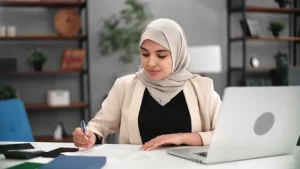Women in Islam were given economical rights 1300 years earlier than the West. In the time of Prophet Mohammed Peace be Upon a woman had the right to own, dispose or disown any of her property without consulting anyone, irrespective of her marital status. England was the first country to recognize the rights of women.
In 1870, England recognized the right of a married woman to own or dispose of her property without consultation. People may say that those rights were ancient, outdated and they are not applicable in the modern era.
Muslim women today can work and earn money and there is no text in the Quran or hadith that prevents that prohibits women from working unless it is an unlawful or unethical job. But this prohibition to specifics jobs is not only applied to Muslim women but also on Muslim men.

Islamic society requires the services of women and expects women to take honorable professions such as doctors, gynecologists, nurses, teachers, etc. Islam doesn’t lay a financial obligation on the shoulder on the women and this obligation is laid on the shoulders on Muslim men to earn money and fully support the family.
Therefore a Muslim woman should not work for her livelihood but if there is some genuine case such as financial crises in family and it’s hard to make both ends meets women can work to support her family. This is optional for women and she is not obliged and can not be forced to work.
In Islam, women work for their own absolute and freewill. Besides the professions mentioned in the starting lines of this paragraph, she can also work in home-based jobs such as tailoring, pottery, making handicrafts, etc. Islam does not believe in the intermingling of the sex so women can work in different industries provided that there is a separate section exclusively designed for ladies.
Women can also do her own business but if it involves transactions and interaction with foreign males (Na-Mehram), she should do it through her father, brother, husband, or son. We can also find an example of this from time of prophet Mohammed peace be upon him, when his wife Hazrat Khadija R.A was a successful businesswoman of her times and she did her transactions through her husband, prophet Mohammed peace be upon Him.
Islam has given more financial security to women as compared to men. As mentioned in earlier lines of this article that financial obligation has been laid on the shoulder on men and he is responsible to provide her food, clothes, and shelter and look after her other financial aspects of life.
Before marriage, it is the responsibility of her father to look after her needs and after marriage, it’s the duty of her husband or son to look after her all financial needs. A woman in Islam is always on receiving end, she receives dower from her parents at the time of her marriage and also receives “Mehr” which is a martial gift from her husband.
Mehr is very important and adds a lot to the financial security of women. It is compulsory for every Muslim man to pay Mehr to his wife after the wedding. Allah SWT says in the Quran:
‘ Give to the woman in dower, a marital gift’.
[AL-Qur’an Ch.4 Verse No.4 ]
Allah has set no maximum limit for Mehr and it depends on the financial status of the person. So a man should pay maximum he can afford to his wife.
“If ye had given the mountain of gold for dower”
[Al-Qur’ a ch 4 verse 20]
In case of divorce or if a wife gets widowed, she is given financial support for the period of ‘Iddah’ and if she has children, she is also given child support. Islam also gave inheritance rights to Women centuries ago. It is mentioned in several verses of the Quran, that women have the right to inherit the property as a wife, mother, sister, and daughter.
This is also compulsory and Allah has fixed her share which is mention is In Surah Baqarah, Ch. No. 2, Verse No. 180, in Surah Baqarah, Ch. No. 2, Verse No. 240, in Surah Nisa, Ch. No. 4, Verse No. 9, it is mentioned in Surah Nisa, Ch. No. 4, Verse No. 19, Surah Maidah, Ch. No. 5, Verse No. 105. Regarding the detailed explanation of the shares read Surah Nisa, Ch. No. 4, Verse No. 11 and 12 and in Surah Nisa, Ch. No. 4, Verse No. 176.


